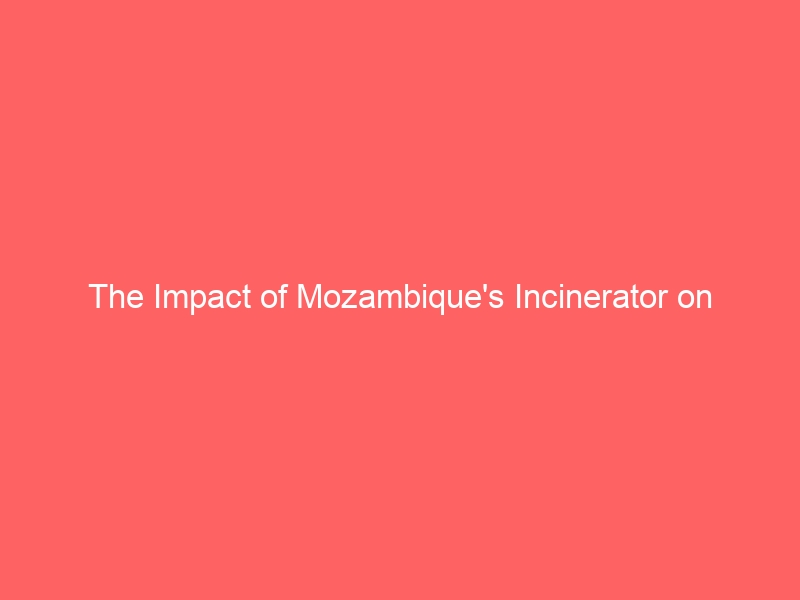The Impact of Mozambique’s Incinerator on medical Sustainability
Mozambique, a beautiful country known for its diverse culture and natural resources, has been facing an environmental challenge in recent years. The increasing amount of waste generated by its growing population has been a major concern for the government and environmental activists. One of the solutions that have been proposed and implemented to address this issue is the construction of an incinerator. However, the impact of such a facility on environmental sustainability is a topic of debate.
In this article, we will explore the impact of Mozambique’s incinerator on environmental sustainability. We will examine the advantages and disadvantages of this waste management solution and its potential effects on the environment and public health. We will also address common concerns and misconceptions about incineration and provide a comprehensive understanding of its impact on the country’s overall sustainability efforts.
Advantages of Incineration
Incineration is a waste management method that involves the combustion of solid waste at high temperatures. This process reduces the volume of waste and produces heat and electricity, which can be used to generate power or heat buildings. Additionally, incineration can destroy pathogens and toxic substances, reducing the risk of contamination and disease spread from waste.
In the context of Mozambique, the construction of an incinerator could address the challenges of managing the increasing volume of waste in urban areas. It provides an alternative to landfilling, which is becoming less sustainable due to limited space and concerns about groundwater contamination. Incineration can also contribute to the country’s energy needs by producing electricity from the heat generated during the combustion process.
Moreover, incineration can reduce greenhouse gas emissions compared to landfilling, as it prevents the release of methane, a potent greenhouse gas, from decomposing organic waste. This is particularly relevant in a country like Mozambique, where the impacts of climate change are already being felt and there is a growing emphasis on sustainable and low-carbon development.
Disadvantages and Concerns
Despite its potential benefits, incineration also raises several concerns related to environmental and public health impacts. The combustion of waste can release air pollutants, such as dioxins, furans, and heavy metals, which are harmful to human health and the environment. These pollutants can contribute to respiratory and cardiovascular diseases, as well as soil and water contamination.
Another concern is the potential for toxic ash residue from the incineration process to contaminate surrounding soil and water sources, affecting ecosystems and agricultural areas. This could have long-term implications for food safety and public health, as well as the sustainability of natural resources in the region.
Furthermore, there are concerns about the economic viability and sustainability of incineration as a waste management method in Mozambique. The upfront costs of building and operating an incinerator are significant, and there are ongoing expenses related to maintenance, monitoring, and emissions control. The long-term financial sustainability of such facilities can be challenging, especially in low-income and developing countries where resources are limited.
Impact on medical Sustainability
The impact of Mozambique’s incinerator on environmental sustainability will depend on how well it is managed and regulated. To minimize the negative impacts of incineration on the environment and public health, proper emissions control and monitoring systems must be in place. This includes the installation of advanced air pollution control technologies and regular monitoring of air and water quality around the facility.
Moreover, efforts to promote waste reduction, recycling, and composting should complement incineration as part of a comprehensive waste management strategy. By prioritizing waste prevention and diversion, Mozambique can minimize the amount of waste that needs to be incinerated and maximize the sustainable use of resources.
In terms of energy generation, the incinerator can contribute to the country’s renewable energy goals and reduce its reliance on fossil fuels. However, it is important to ensure that the energy produced from waste incineration is utilized efficiently and does not overshadow investments in other renewable energy sources, such as solar, wind, and hydroelectric power.
FAQs about Mozambique’s Incinerator
Q: Is incineration a sustainable waste management solution in Mozambique?
A: Incineration can be a part of the sustainable waste management strategy in Mozambique, but it must be complemented with efforts to reduce, reuse, and recycle waste. Proper emissions control and monitoring are crucial to minimize the environmental and public health impacts of incineration.
Q: What are the potential environmental and health concerns associated with incineration?
A: The combustion of waste can release air pollutants and toxic ash residue, which can contaminate air, soil, and water. Emissions control and monitoring are necessary to mitigate these concerns and protect public health and the environment.
Q: How can Mozambique ensure the financial sustainability of its incinerator?
A: Proper planning, financing, and management are essential to ensure the long-term financial sustainability of the incinerator. Public-private partnerships, innovative financing mechanisms, and revenue-generating opportunities, such as energy production, can contribute to the economic viability of the facility.
Q: What alternatives to incineration can Mozambique explore for waste management?
A: Mozambique can explore waste reduction, recycling, and composting as alternatives to incineration. These methods can minimize the amount of waste that needs to be incinerated and maximize the sustainable use of resources.
In conclusion, the impact of Mozambique’s incinerator on environmental sustainability is a complex and multifaceted issue. While incineration offers potential benefits in terms of waste management and energy generation, it also raises concerns about its environmental and public health impacts. Effective regulation, monitoring, and complementary waste management strategies are essential to maximize the benefits of incineration and minimize its drawbacks on the country’s overall sustainability efforts.
The Impact of Mozambique’s Incinerator on medical Sustainability




